The Robotic X-ray Scanner Market is estimated to be valued at USD 568.6 million in 2025 and is projected to reach USD 1766.0 million by 2035, registering a compound annual growth rate (CAGR) of 12.0% over the forecast period.
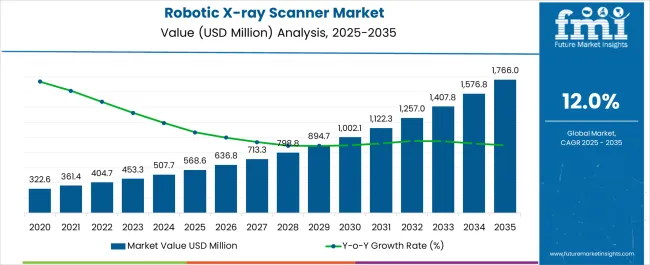
| Metric | Value |
|---|---|
| Robotic X-ray Scanner Market Estimated Value in (2025 E) | USD 568.6 million |
| Robotic X-ray Scanner Market Forecast Value in (2035 F) | USD 1766.0 million |
| Forecast CAGR (2025 to 2035) | 12.0% |
The robotic X-ray scanner market is witnessing accelerated growth, driven by the increasing integration of automation and robotics into medical imaging systems to enhance diagnostic accuracy and operational efficiency. Rising demand for advanced imaging solutions in healthcare facilities, combined with the growing incidence of trauma cases, orthopedic conditions, and complex medical emergencies, is influencing adoption. Robotic X-ray systems are providing significant benefits through improved precision, reduced radiation exposure, and enhanced workflow management, which are becoming critical for hospitals and diagnostic centers.
Technological advancements such as AI-assisted imaging, automated positioning, and integration with digital health platforms are further elevating the value proposition of robotic X-ray scanners. Healthcare providers are prioritizing investments in robotics-enabled imaging technologies to improve patient throughput and optimize resource utilization.
Increasing government and private sector spending on healthcare infrastructure modernization is also contributing to strong market momentum As patient safety, image quality, and operational efficiency continue to drive innovation, the robotic X-ray scanner market is anticipated to maintain strong growth across both developed and emerging healthcare markets.
The robotic x-ray scanner market is segmented by application, end user, and geographic regions. By application, robotic x-ray scanner market is divided into Trauma, Surgery, and Orthopaedics. In terms of end user, robotic x-ray scanner market is classified into Hospitals, Less than 200 Beds, 200-500 Beds, More than 500 Beds, Ambulatory Surgical Centres, and Diagnostic Imaging Centres. Regionally, the robotic x-ray scanner industry is classified into North America, Latin America, Western Europe, Eastern Europe, Balkan & Baltic Countries, Russia & Belarus, Central Asia, East Asia, South Asia & Pacific, and the Middle East & Africa.
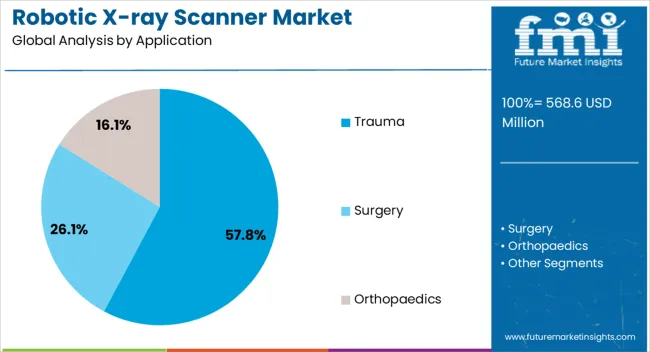
The trauma application segment is projected to account for 57.8% of the robotic X-ray scanner market revenue share in 2025, positioning it as the leading application area. This leadership is being driven by the rising incidence of accidents, injuries, and emergency medical cases that require rapid and precise imaging for diagnosis and treatment planning. Robotic X-ray scanners in trauma care are enabling quick patient positioning, consistent image quality, and minimal repositioning, which are critical in emergency environments.
The capability of these systems to operate with reduced radiation exposure while ensuring high accuracy is enhancing their acceptance in trauma departments. Healthcare facilities are prioritizing robotic imaging solutions for trauma care to accelerate diagnostic decision-making and reduce delays in treatment.
The increasing integration of AI-based image analysis tools with robotic scanners is further improving diagnostic reliability, particularly in high-stress emergency situations With the growing emphasis on patient outcomes, efficiency, and safety in trauma care, robotic X-ray scanners are expected to remain the preferred choice for healthcare providers dealing with complex emergency scenarios.
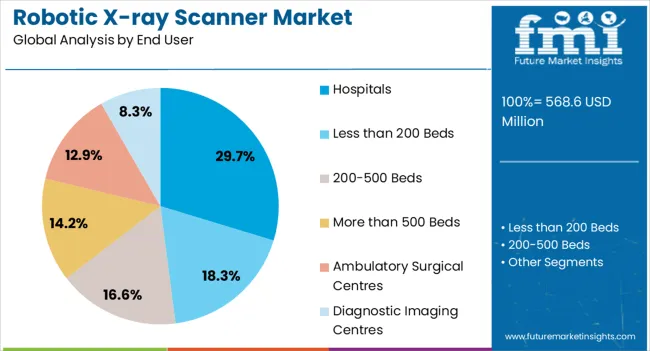
The hospitals segment is expected to capture 29.7% of the robotic X-ray scanner market revenue share in 2025, establishing itself as the dominant end user category. Its leadership is being reinforced by the central role hospitals play in delivering comprehensive diagnostic and treatment services, which require advanced imaging solutions to support diverse medical needs. Robotic X-ray scanners are being increasingly adopted in hospitals to optimize imaging workflows, enhance accuracy, and improve patient comfort.
Hospitals are prioritizing these systems due to their ability to streamline operations, reduce manual intervention, and integrate seamlessly with hospital information systems and electronic medical records. Rising patient volumes, coupled with the demand for faster and more reliable imaging, are accelerating investments in robotic X-ray technologies within hospital settings.
Additionally, hospitals are benefiting from the scalability of these solutions, which allow expansion from trauma and emergency departments to specialized units such as orthopedics, cardiology, and oncology As hospitals continue to modernize infrastructure and adopt robotics-enabled diagnostic tools, their position as the leading end user segment is expected to strengthen further.
Robotic X-ray scanner is a medical imaging device which gives flexibility to the medical practitioner. It has got its name from its characteristic of moving according to commands given to it. This robotic X-ray scanner uses radiographic abilities and is used in fields of emergency care, critical care, orthopaedic and surgical and non-surgical processes. The X-ray source and X -ray detector can move simultaneous without moving the patient. Robotic X-ray scanner comes in handy when patient is unconscious and is unable to move or respond.
Robotic X-ray scanner has capability to produce real-time images during surgery process and enabling the medical practitioners to observe patient's anatomy distinguishes changes during and after the surgery better than that of other diagnostic imaging devices such as MRI machines, traditional X-rays and ultrasounds.
Robotic X-ray scanner adds supreme elasticity to surgical process. Robotic X-ray scanner reduces the time required during surgery procedures for scanning patient and helps to take critical decisions according to the situation. This all can be done without patient been carried from one room to another just for X-ray. Robotic X-ray empowers swifter, smoother and easy patient positioning and completion of procedures.
Presently, Robotic X-ray scanner global market is driven by the technological development in healthcare industry, increase in geriatric population, and increasing prevalence of osteoporosis and other bone related disease. Robotic X-ray scannerglobal market is expected to grow by the factors such as rapid innovation in products,technological advancement in production and modelling technologies, increasing privatization in the healthcare sector, rising acceptance of refurbished medical imaging devices in emerging countries.
Globally manufacturers have been modifying their product lines to attract more consumers and as a result, it assist them to stay forward of the competition.The major restraint faced by the market is the high cost of robotic X-ray scanner. Various end-users do not have the financial plan to capitalize on expensive robotic X-ray scanners.
The global robotic X-ray scannermarket is expected to grow with a healthy CAGR over the forecast period (2025-2026) due to advancement in technology, approval of new products in different regions, increase in adoption rate of robotic X-ray scanner devices, and increase in healthcare expenditure across the globe.
Depending on geographic region, robotic X-ray scanner global market is segmented into seven key regions: North America, Latin America, Eastern Europe, Western Europe, Asia Pacific Excluding Japan, Japan and Middle East & Africa.
North America is estimated to hold maximum share by revenue in global robotic X-ray scannermarket due to the increasing awareness about medical imaging equipment, financial stability to purchase exclusive medical imaging devices, adoption of technically-advanced products, and growing infrastructure investment to support medical and healthcare development. Whereas, Asia-Pacific is likely to grow at the highest CAGR in diagnosis and interventional radiology procedures due to increase in disposable income and healthcare expenditure.
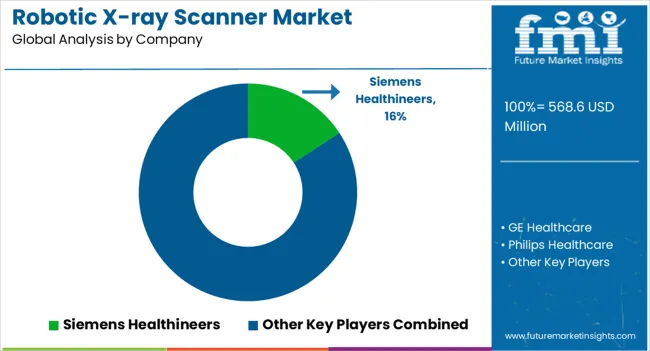
Some of the key participating players in global robotic X-ray scanner market are Siemens AG, Philips Healthcare, GE Healthcare Inc.,Ziehm Imaging, Hologic corp., BMI Biomedical International s.r.l., Medonica Co. Ltd., DMS Health Technologies, Gemss Co. Ltd., Shimadzu Corp. and others.
The research report presents a comprehensive assessment of the market and contains thoughtful insights, facts, historical data, and statistically supported and industry-validated market data. It also contains projections using a suitable set of assumptions and methodologies. The research report provides analysis and information according to categories such as market segments, geographies, types, technology and applications.
The report is a compilation of first-hand information, qualitative and quantitative assessment by industry analysts, inputs from industry experts and industry participants across the value chain. The report provides in-depth analysis of parent market trends, macro-economic indicators and governing factors along with market attractiveness as per segments. The report also maps the qualitative impact of various market factors on market segments and geographies.
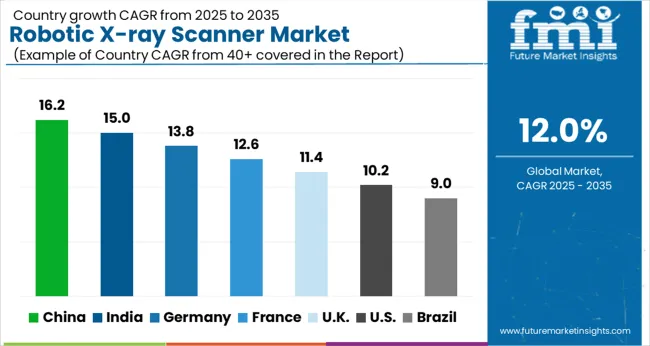
| Country | CAGR |
|---|---|
| China | 16.2% |
| India | 15.0% |
| Germany | 13.8% |
| France | 12.6% |
| UK | 11.4% |
| USA | 10.2% |
| Brazil | 9.0% |
The Robotic X-ray Scanner Market is expected to register a CAGR of 12.0% during the forecast period, exhibiting varied country level momentum. China leads with the highest CAGR of 16.2%, followed by India at 15.0%. Developed markets such as Germany, France, and the UK continue to expand steadily, while the USA is likely to grow at consistent rates. Brazil posts the lowest CAGR at 9.0%, yet still underscores a broadly positive trajectory for the global Robotic X-ray Scanner Market. In 2024, Germany held a dominant revenue in the Western Europe market and is expected to grow with a CAGR of 13.8%. The USA Robotic X-ray Scanner Market is estimated to be valued at USD 198.5 million in 2025 and is anticipated to reach a valuation of USD 524.3 million by 2035. Sales are projected to rise at a CAGR of 10.2% over the forecast period between 2025 and 2035. While Japan and South Korea markets are estimated to be valued at USD 30.2 million and USD 16.8 million respectively in 2025.
| Item | Value |
|---|---|
| Quantitative Units | USD 568.6 Million |
| Application | Trauma, Surgery, and Orthopaedics |
| End User | Hospitals, Less than 200 Beds, 200-500 Beds, More than 500 Beds, Ambulatory Surgical Centres, and Diagnostic Imaging Centres |
| Regions Covered | North America, Europe, Asia-Pacific, Latin America, Middle East & Africa |
| Country Covered | United States, Canada, Germany, France, United Kingdom, China, Japan, India, Brazil, South Africa |
| Key Companies Profiled | Siemens Healthineers, GE Healthcare, Philips Healthcare, Canon Medical Systems Corporation, Carestream Health, Hitachi Healthcare, Samsung Healthcare, Shimadzu Corporation, Fujifilm Holdings Corporation, and Agfa-Gevaert Group |
The global robotic x-ray scanner market is estimated to be valued at USD 568.6 million in 2025.
The market size for the robotic x-ray scanner market is projected to reach USD 1,766.0 million by 2035.
The robotic x-ray scanner market is expected to grow at a 12.0% CAGR between 2025 and 2035.
The key product types in robotic x-ray scanner market are trauma, surgery and orthopaedics.
In terms of end user, hospitals segment to command 29.7% share in the robotic x-ray scanner market in 2025.






Our Research Products

The "Full Research Suite" delivers actionable market intel, deep dives on markets or technologies, so clients act faster, cut risk, and unlock growth.

The Leaderboard benchmarks and ranks top vendors, classifying them as Established Leaders, Leading Challengers, or Disruptors & Challengers.

Locates where complements amplify value and substitutes erode it, forecasting net impact by horizon

We deliver granular, decision-grade intel: market sizing, 5-year forecasts, pricing, adoption, usage, revenue, and operational KPIs—plus competitor tracking, regulation, and value chains—across 60 countries broadly.

Spot the shifts before they hit your P&L. We track inflection points, adoption curves, pricing moves, and ecosystem plays to show where demand is heading, why it is changing, and what to do next across high-growth markets and disruptive tech

Real-time reads of user behavior. We track shifting priorities, perceptions of today’s and next-gen services, and provider experience, then pace how fast tech moves from trial to adoption, blending buyer, consumer, and channel inputs with social signals (#WhySwitch, #UX).

Partner with our analyst team to build a custom report designed around your business priorities. From analysing market trends to assessing competitors or crafting bespoke datasets, we tailor insights to your needs.
Supplier Intelligence
Discovery & Profiling
Capacity & Footprint
Performance & Risk
Compliance & Governance
Commercial Readiness
Who Supplies Whom
Scorecards & Shortlists
Playbooks & Docs
Category Intelligence
Definition & Scope
Demand & Use Cases
Cost Drivers
Market Structure
Supply Chain Map
Trade & Policy
Operating Norms
Deliverables
Buyer Intelligence
Account Basics
Spend & Scope
Procurement Model
Vendor Requirements
Terms & Policies
Entry Strategy
Pain Points & Triggers
Outputs
Pricing Analysis
Benchmarks
Trends
Should-Cost
Indexation
Landed Cost
Commercial Terms
Deliverables
Brand Analysis
Positioning & Value Prop
Share & Presence
Customer Evidence
Go-to-Market
Digital & Reputation
Compliance & Trust
KPIs & Gaps
Outputs
Full Research Suite comprises of:
Market outlook & trends analysis
Interviews & case studies
Strategic recommendations
Vendor profiles & capabilities analysis
5-year forecasts
8 regions and 60+ country-level data splits
Market segment data splits
12 months of continuous data updates
DELIVERED AS:
PDF EXCEL ONLINE
Robotic Warfare Market Size and Share Forecast Outlook 2025 to 2035
Robotic Lawn Mower Market Size and Share Forecast Outlook 2025 to 2035
Robotics Welding Market Size and Share Forecast Outlook 2025 to 2035
Robotic Rehab Tools Market Analysis - Size, Share, and Forecast Outlook 2025 to 2035
Robotics-Assisted Telesurgery Market Size and Share Forecast Outlook 2025 to 2035
Robotic Packaging Machines Market Size and Share Forecast Outlook 2025 to 2035
Robotic Assisted Endovascular Systems Market Size and Share Forecast Outlook 2025 to 2035
Robotic Lung Biopsy Market Size and Share Forecast Outlook 2025 to 2035
Robotics as a Service (RaaS) Market Size and Share Forecast Outlook 2025 to 2035
Robotic Catheterization Systems Market Growth – Innovations, Trends & Forecast 2025-2035
Robotic Aseptic Syringe Filler Capper Market Size and Share Forecast Outlook 2025 to 2035
Robotic Vision Market Size and Share Forecast Outlook 2025 to 2035
Robotics Actuators Market Size and Share Forecast Outlook 2025 to 2035
Robotic Biopsy Devices Market Insights - Trends & Forecast 2025 to 2035
Robotic Palletizers & De-Palletizers Market Growth - Forecast 2025 to 2035
Robotic Vacuum Cleaners Market Growth - Trends & Demand from 2025 to 2035
The Robotics Market Analysis – Size, Share, and Forecast Outlook 2025 to 2035
Robotics Prototyping Market Trends - Growth & Forecast 2025 to 2035
Robotic Process Automation Market by Component, Operation, Industry & Region Forecast till 2025 to 2035
Competitive Landscape of Robotic Vacuum Cleaner Providers

Thank you!
You will receive an email from our Business Development Manager. Please be sure to check your SPAM/JUNK folder too.
Chat With
MaRIA